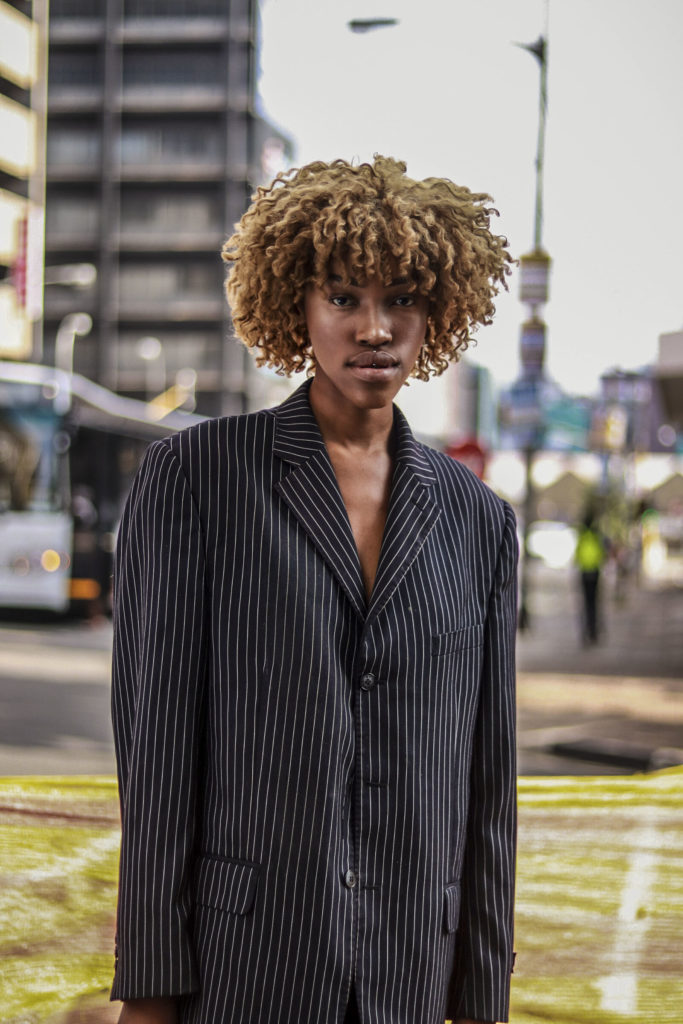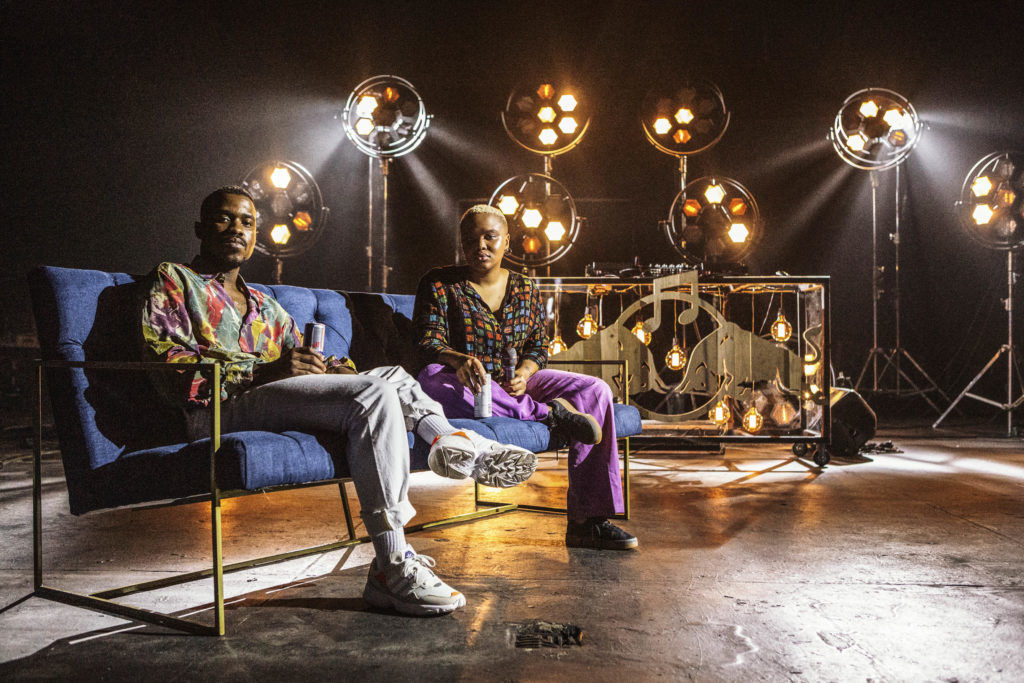Ponahalo Mojapelo's decision to have multiple hustles was driven by needing the money as well as wanting to explore her talents. (Wanga Mtlokwa)
In a report by the Financial Times, futurologists predict that in 2050 only one billion of the six billion workers in the world’s labour force will be in jobs we recognise today. The report says that multi-hustle freelance will be the new “real job”.
It’s no wonder, the nature of economics is a cruel one afterall. Technology is constantly evolving, affecting the needs and desires of societies. The once highly sought-after fax machine repairer is no longer coveted. Jobs rise to prominence and fall to obscurity within a decade.
The past 10 years have ushered in new players. Young South Africans are making careers for themselves as digital content creators. One might ask: What is it exactly that they do?
These content creators are those who can refer to themselves as dancers, stylists, photographers, DJs and models in the same breath.
“I’d describe what I do as nothing monolithic,” Nkhensani Mkhari, 25, said. “I’m an artist, I’m a curator and I’m a cultural producer.”
 Nkhensani Mkhari refers to themself as a generalist (Paul Botes)
Nkhensani Mkhari refers to themself as a generalist (Paul Botes)
They spend their days curating for the BKhz gallery in Braamfontein, Johannesburg. When Mkhari’s not doing that, they are an abstract painter or a photographer, capturing the world through their soft, hazy lens. So far this has landed them opportunities spanning a residency with Fak’ugesi digital innovation festival in 2018 to a solo exhibition in Paris, France.
To have reached this point, Mkhari had a lot to overcome. “Even though my parents were, like, ‘You can do whatever you like,’ I couldn’t do whatever I liked. I had to go to varsity, but I wasn’t doing what I loved. There were a lot of broken people, because it’s a university space. Being broken in a space where there’s thousands of people … it’s very hard to find yourself in a lecture room with like a hundred other people.”
But Mkhari is here now, paying their bills and feeling secure in their very many endeavours. “There are specialists and there are generalists. I’m a generalist. I don’t specialise in anything,” they proudly assert.
Mkhari doesn’t care to be confined to any one particular medium of creation. Being a cultural producer is not necessarily about creating one product, but rather a space for ideas and their own expression.
In the same vein, Ponahalo Mojapelo, 20, strays away from strict definitions, but knows herself to be a multi-careerist in the creative industry. “I love keeping busy and exploring every one of my capabilities to the maximum.” She has her hands in writing, DJing, modelling and is a budding stylist. As a model, Mojapelo has worked with brands like Your Step Mother, Viviers and Thebe Magugu. As a DJ she played sets from Kitcheners to the Feel Good Series party.
 Ponahalo Mojapelo is a budding stylist, a model, writer and DJ. (Wanga Mtlokwa)
Ponahalo Mojapelo is a budding stylist, a model, writer and DJ. (Wanga Mtlokwa)“My choice to be a multiculturalist was definitely based on needing money, but mostly on just having the time, the access and the capability to do it all,” she said.
“Savings, savings, savings. I would advise all creatives to have a healthy relationship with their savings account,” she advises. “Some months are better than others but I think working four jobs has helped keep me afloat for the most part.”
While these young creatives brand themselves and don’t allow anyone else to do it for them, the work that they do is not free of challenges.
“I’d say being an emerging creative places you in a position that’s very vulnerable to exploitation and not really knowing what you’re worth,” Mojapelo says. Even in the ambiguity surrounding their work, they have to be certain of who they are and what they do.
Capitalism socialises us to be critical of those who don’t clearly fit into any box. There is a fascination with where and how someone earns their money as a “content creator” or “creative”.
“You’ll obviously get the occasional ‘Are you gonna get a real job?’ But, I mean, I think that’s normal,” says Yoza Mnyanda, 25. “People are programmed a certain way, and they think if you’re not waking up every day at a certain time and doing something that looks like what they’re used to, then how are you even surviving? How do you even have food in your fridge?”
 Yoza Mnyanda works in the cinematography and music spaces with her partner and member of Darkie Fiction, Katt Daddy (Mpumelelo Macu)
Yoza Mnyanda works in the cinematography and music spaces with her partner and member of Darkie Fiction, Katt Daddy (Mpumelelo Macu)
Mnyanda and her partner, Katt Daddy, formed the music duo Darkie Fiction in 2017, after having pursued musical endeavours separately. Since then, the duo has released their debut EP Sobabini and a music documentary titled Little America in addition to headlining at music events like TRACE Fest (2018) Oppikopi (2018), Afropunk (2019). Yet Mnyanda still feels like she has a lot to do in film, her true passion.
“To make money every now and then I also edit various things for people. I’m kind of in the film scene every now and then, but not as much as I’d want to be. But right now, I’m more of an editor than I am a cinematographer. But my true passion is cinematography,” says Mnyada.
In as much as our creatives may be juggling multiple jobs, this is not to say that all jobs are equal. Like everyone, bills are pressing. On top of long days and nights of editing and shoots, Mnyada has the job of motherhood on her plate too.
“The aim is sustenance,” she says.
It isn’t enough anymore to go university and pay tens of thousands of rands to get a degree that may get you a job. Statistics South Africa reported that in the first quarter of 2019, the unemployment rate among graduates in the age group 15 to 24 years, 31% of graduates are unemployed. A degree is no longer the cushion to ensure a comfy ride in the job market.
Kwanele Kunene, 29, a self-branded creative freelancer, forged her way into broadcast journalism, voice over work and the arts without the degree parachute on her back. “I had to learn to trust myself and not concern myself with the critiques of others,” she reflects. “Self-doubt doesn’t just creep in my world. Many times (especially in the past) it’s been my leader. I suppose this has mostly been because I haven’t been playing with the same skills and tools as my peers.”
Kunene is sceptical about the notion of mentorship. The journey into navigating the creative scene of Johannesburg (let alone South Africa as a whole) is a tough one. She talked about how one has to attend the right parties, wear the right clothes and have the look for Instagram. In her eyes, “we’re obsessed with a celebrity or with people who we admire, [to the point that] we think that they should be the ones to show us how to navigate our personal or professional worlds”. It might get you through the right doors, but to actually affirm yourself in the space?
“No one can do that for you, only you can,” Kunene advises.
In spite of her doubts and the lack of definite mentorship, she follows her heart. “I try to involve myself in projects that bring me joy creatively.” For Kunene and many other creatives on the scene, “when you have a real job, you want to go balls to the wall with the work you involve your energy in”.
As the job market’s face continues to shift and morph before our eyes, Liberty Insurance is introducing salary insurance for people who earn multiple salaries.
The young creatives who have collaged different aspects of several careers seem to be seeing the bigger picture.
The bigger picture is blurry. Amid the shaky South African economy, futurologist predictions and the rapidly industrialising global workforce, Mkhari has this to say: “I believe my dreams are my dreams and only I need to believe in them.”